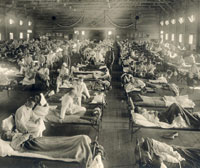Front Page
-
Fannin County voters will go back to the polls May 26 in a runoff election that will determine if H. Compton or John Tynan will be the next Fannin County judge. Derek Moore won the treasurer's race, Brandon Wallace will be the commissioner for Pct. 2, Mike Keene defeated incumbent Doug Kopf. Keene in the race for commissioner of Pct. 2, and Mark Buchanan was a decisive winner in the race for Justice of the Peace, Pct. 2.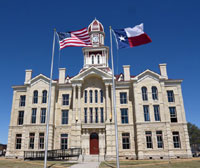
-
With four seats up for election May 2, and with only one candidate filing to run in each of the four races, Bonham City Council is expected to cancel the general election for Ward 1 and Ward 5 and cancel the special election for Ward 4 and mayor.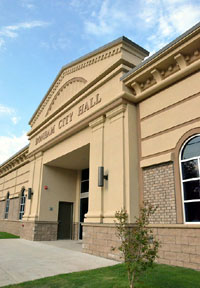
-
The Samaritan Inn, the largest comprehensive homeless shelter in North Texas serving single men, women, and families, is expanding one of its most unique programs: PAWS (Pets Are Welcome to Stay). For more than 15 years, PAWS has provided on-site kennels, pet food, and veterinary care at The Samaritan Innfs 15-acre campus, helping remove a major barrier to shelter access for individuals experiencing homelessness who have pets. Thanks to a generous grant from The Stephens Greth Foundation, The Samaritan Inn is expanding the program.
-
Rain may slightly delay the installation of a new roof at the Fannin County Justice Center and Pct. 1 Commissioner Troy Waggoner said the county will also have to address drainage issues on the north and west sides of the Justice Center.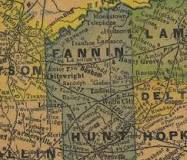
-
Grayson County Historical Society will be celebrating Women's History Month at their meeting on Tuesday March 10, 2026 at 6:30 p.m. and the organization has invited Lana Caswell-Garcia to present her program "The Immortal Life of Henrietta Lacks." After Lacks's death, scientists made her immortal because her cells were taken without consent and have been used in saving many lives. Lacks died at the age of 31 in 1951.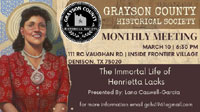
-
1918 A case of influenza was recorded at Camp Funston, Kansas, conventionally marking the beginning of the worldwide Spanish flu pandemic. The 19181920 flu pandemic, also known as the Great Influenza epidemic or by the common misnomer Spanish flu, was an exceptionally deadly global influenza pandemic caused by the H1N1 subtype of the influenza A virus. The earliest documented case was March 1918 in Haskell County, Kansas, United States, with further cases recorded in France, Germany and the United Kingdom in April. Two years later, nearly a third of the global population, or an estimated 500 million people, had been infected. Estimates of deaths range from 17 million to 50 million, and possibly as high as 100 million, making it one of the deadliest pandemics in history. The pandemic broke out near the end of World War I, when wartime censors in the belligerent countries suppressed bad news to maintain morale, but newspapers freely reported the outbreak in neutral Spain, creating a false impression of Spain as the epicenter and leading to the "Spanish flu" misnomer.[10] Limited historical epidemiological data make the pandemic's geographic origin indeterminate, with competing hypotheses on the initial spread. Most influenza outbreaks disproportionately kill the young and old, but this pandemic had unusually high mortality for young adults. Scientists offer several explanations for the high mortality, including a six-year climate anomaly affecting migration of disease vectors with increased likelihood of spread through bodies of water. However, the claim that young adults had a high mortality during the pandemic has been contested. Malnourishment, overcrowded medical camps and hospitals, and poor hygiene, exacerbated by the war, promoted bacterial superinfection, killing most of the victims after a typically prolonged death bed.